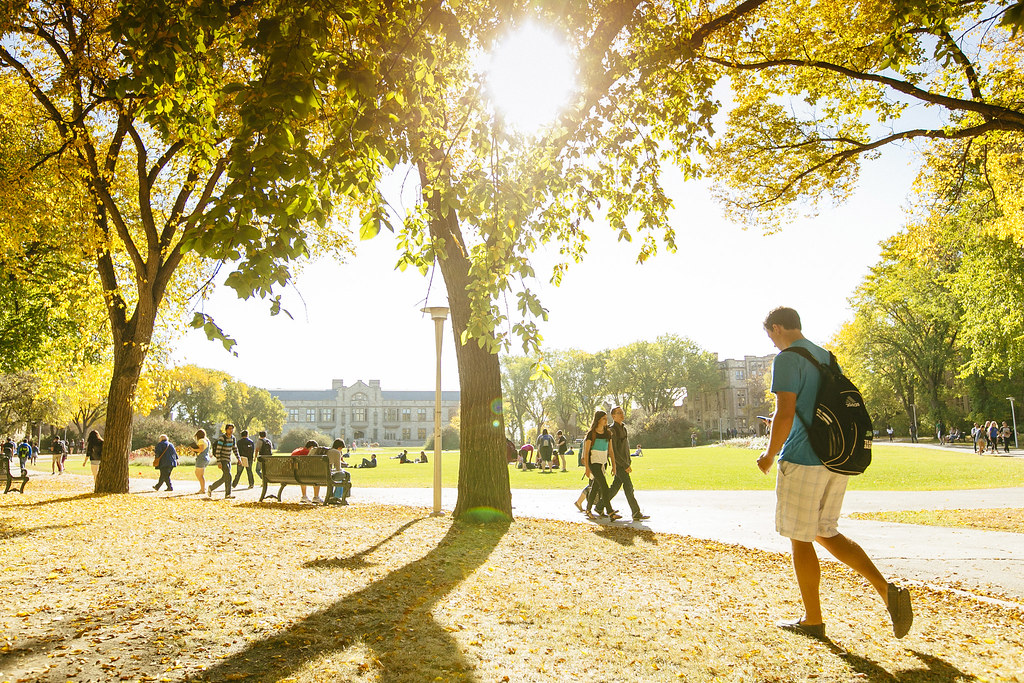
Photo: David Stobbe / University of Saskatchewan.
Written by guest blogger Erika Dyck.
In May 2020 I wrote a short article about working from home during COVID, which I subtitled “coping with the guilt of unmet expectations”. Reflecting on that piece a few months later, I’m not sure that I have learned how to cope, but coping has become normal.
Since May I have visited my campus once. That day on the September long-weekend it looked like a movie set for a post-apocalyptic film; an empty place with locked buildings and darkened corridors, signs every few feet warning us to wash our hands or not to touch things, posters of cartoon figures showing us how to put on masks, and not a soul in sight. I had to seek special permission to enter my office, up in the Arts Tower and I encountered one colleague, masked, and distanced who was just moving into his new faculty office, alone. Welcome.
In September the place is usually literally bumping. My office window looks out onto the scenic “bowl” or pedestrian-only green space that is typically swarming with students, food tables, music and a beer tent to welcome (back) students and help them transition into a new phase of their learning career. In fact, the din of noise is often so distracting that I now avoid even trying to write or edit during the first two weeks of September. Besides, I am usually discovering new mistakes in my freshly distributed syllabi, avoiding the book store, or recalibrating how much time it takes to get a coffee or lunch once classes start. But, as much as the line-ups are long, the excitement of the new term is always energizing.
This time my courses started with the sound of construction crews digging up the street in front of my house to repair a water main break. It is a far cry from the thump of the base pounding in a beer tent, but oddly comforting as I tried to bring a level of enthusiasm to my virtual classroom/home office. And, I managed to recreate the stress of starting a new class by sifting through back-to-school plans and mask debates for kids, and while watching the small geyser in front of my house spew water as I wondered whether I had filled enough pots to get us through the evening without running water. Coping with the stress of uncertainty has become normal.
Writing hasn’t gotten any easier as I acclimatize to the new-normal state of general anxiety about work, upcoming elections, Black and Indigenous lives, and the environment. I have continued to prioritize work that supports my students, or junior scholars, but I have slowly begun to accept that guilt about unmet research and writing obligations simply takes too much energy. And without exposure to the enthusiasm and nervous excitement that floods a university campus each September, I just don’t have that kind of energy to spare.
Lastly, I want to make a plea to my academic colleagues: I have watched the twitter-verse discussions about how pandemic conditions have redrawn productivity benchmarks, making it even more difficult for anyone with caregiving responsibilities to compete for jobs, or to get published. Much of that conversation has focused on gender. As a journal editor, I want to weigh in. My journal has had a surprisingly steady submission rate, which has slightly favoured women authors. That said I see a troubling trend emerging in the review process. Many of our submissions are coming from first-time authors and precariously positioned historians. Our reviewers tend to be more established; many of them are tenured professors. We have gone from a pre-Covid review environment where we typically ask 3 or 4 people in order to secure 2 reviewers, who generally provide reports in 3-4 weeks. Today we are asking 10 or more people in order to identify 2 willing reviewers, and almost invariably providing review extensions. I believe this is the reality of reviewer burnout and academic exhaustion more generally, and I also agree that pandemic productivity is a new kind of academic social capital that reinstates older forms of privilege. However, I implore readers to consider how we can disrupt these trends by supporting one another.
Erika Dyck is a Professor and Canada Research Chair in the History of Health & Social Justice at the University of Saskatchewan. She is the co-editor of Canadian Bulletin of Medical History and co-editor of two McGill-Queen’s University Press book series, History of Health & Medicine, and Intoxicating Histories of Alcohol and Drugs.
Her recent article in the Journal of Scholarly Publishing, published in “A Compilation of Short Takes on Working from Home” is free to read for a limited time here.
The UTP Journals blog features guest posts from our authors. The opinions expressed in these posts may not necessarily represent those of UTP Journals and their clients.
Comments on this entry are closed.